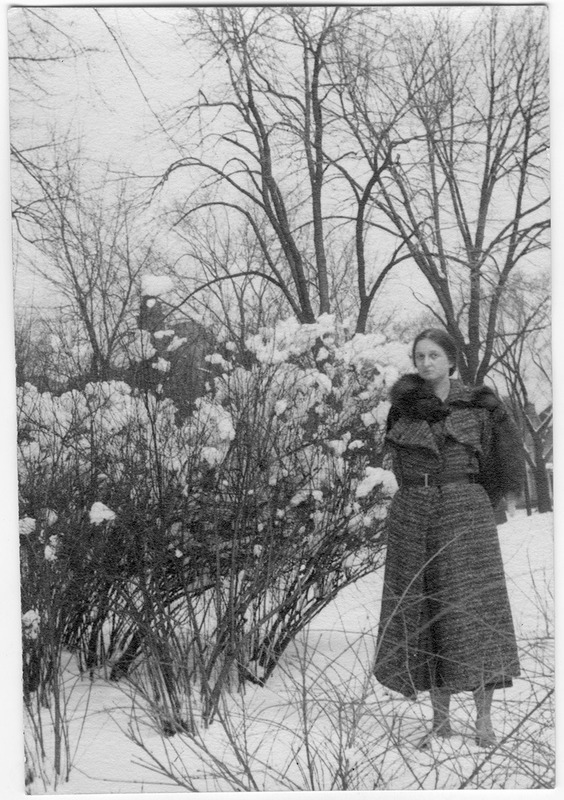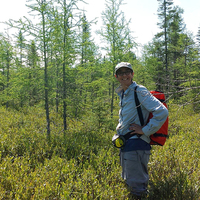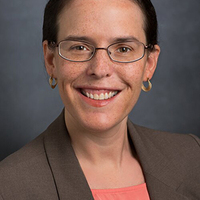March 2021 - Dr. Catherine J. Murphy
Dr. Catherine J. Murphy is the Larry R. Faulkner Endowed Chair in Chemistry and is the first female head of the Department of Chemistry. She is also affiliated with the Department of Bioengineering, the Department of Materials Science and Engineering, the Materials Research Lab, the Micro and Nanotechnology Lab, the Center for Advanced Study, the Carle Illinois College of Medicine, and the Beckman Institute for Advanced Science and Technology. Dr. Murphy's research focuses on inorganic nanomaterials and their biological and energy-related applications.
From the University Archives
As the first woman head of the Department of Chemistry, Dr. Catherine J. Murphy has made history at the University of Illinois. Throughout much of the twentieth century, another female chemist, Dr. Virginia Bartow, was known for encouraging women in chemistry, as well as ensuring that all chemistry students at the University of Illinois studied about the history of chemistry as part of their education.
Virginia Bartow was the daughter of a chemistry professor, Edward Bartow, who spent much of his career at the University of Illinois at Urbana-Champaign before retiring at the University of Iowa. After growing up in Urbana, Virginia attended college at Vassar University, where she especially enjoyed her classes in history and in chemistry. She pursued her graduate work in chemistry at the University of Illinois, and after several years teaching elsewhere, returned to the University of Illinois as an instructor in 1925. Dr. Bartow was promoted to an assistant professor in 1939, and then to an associate professor in 1955, where she remained until her retirement in 1962.
One of Dr. Virginia Bartow's priorities as a professor was ensuring that chemistry students were well aware of the history of chemistry as part of their studies. In addition to teaching regular classes on the history and literature of chemistry, Dr. Bartow also headed the American Chemical Society's History of Chemistry Division from 1952 to 1954. During her tenure, she sought out other influential chemists of the day in order to host symposia and conferences reflecting on recent chemical developments. For example, Dr. Bartow communicated with George Kistiakowsky, a physicist who had worked on the Manhattan Project to build the atomic bomb, about a potential conference on the contribution of chemists to the development of atomic energy.
As part of her efforts to highlight the history of chemistry, Dr. Bartow created her "chemical genealogy" in 1939. This genealogy outlined the relationship between professors of chemistry at the University of Illinois, their doctoral mentors, and other doctoral mentors going back as far as was possible. This chemical genealogy inspired other, similar projects at universities across the country, and aimed to help students feel connected to the influential chemists that they learned about in their classes.
As one of few female professors at the time, Dr. Bartow took it upon herself to support and encourage female students of chemistry, identify potential career paths for women chemists, and highlight the contributions of women to chemistry. While she had been successful in securing a position teaching chemistry at the university level, Virginia had no misgivings about acknowledging the barriers to women who wanted to study and pursue careers in chemistry. In 1936, she drafted an article called "Impressions Relating to Positions for Women in Chemistry," in which she listed a series of career options for women, as well as strategies for acknowledgment and promotion. She notes that, in many cases, employers preferred to hire men because of perceptions that they would be more likely to stay "beyond the period...of liability" to a company. In the case of secondary schools, Dr. Bartow asserts that Boards of Education preferred male science instructors so "he can also be an athletic coach."
In order for women chemists to secure jobs in their field, Dr. Bartow recommended that they try getting their foot in the door by working as a laboratory technician or secretary, with the hope that after some experience, they could "make [themselves] indispensable" and secure more responsibility. Alternatively, she suggests that women specialize in narrow fields, or in fields that were considered to be of particular interest to women, such as nutrition or textiles. She also highlights science librarianship as a path that was in considerable demand that women with strong backgrounds in chemistry would be well-suited for, noting a few cases where chemistry librarians were eventually permitted to work in laboratories as well.
Besides her support of careers in chemistry for women, Dr. Bartow also served as the faculty sponsor for the University of Illinois "Iodine" chapter of the Iota Sigma Pi National Chemical Honor Society for Women from 1925 until 1962. She also applied her undergraduate education in history to write a survey of important contributions of women in the field of chemistry. In addition to highlighting famous, and somewhat contemporary names, such as Marie Curie, Virginia also highlighted women who are less well-known today. Some of these include Ellen Richards (known as the founder of Home Economics, an expert in sanitary chemistry, and a mentor to Isabel Bevier), Jane Marcet (author of a book called Conversations on Chemistry that was directed towards the public), and Carrie Everson (who developed a new procedure for extracting metal from ore).
Throughout her career, Virginia Bartow continued to support the study of the history of science and encourage women in science, was an important contribution to the University of Illinois at Urbana-Champaign's Department of Chemistry. Although she does not use the words "gender discrimination," Dr. Bartow's reports on careers for female chemists provide fascinating insights into the steps women often needed to take in order to be respected in the field during the mid-twentieth century.
Sources and Further Reading
Virginia Bartow Papers, 1908, 1917-19, 1923-30, 1935-80, University of Illinois Archives
Edward Bartow Papers, 1870-1959, University of Illinois Archives
"Bartow, Virginia (1896-1980)," Department of Chemistry, University of Illinois at Urbana-Champaign



